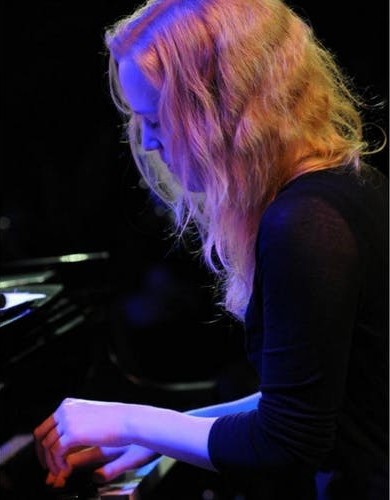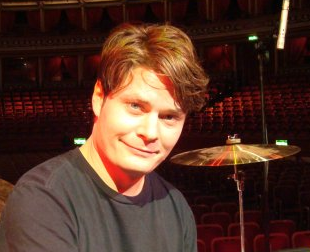
Katharine Hedlund
Paul Taylor, the local multi-instrumentalist extraordinaire who manages the recording studio at Crosstown Arts, recently approached me about a project he was particularly excited about: a live jazz recording session, open to the public, that would be held in the Green Room listening space this weekend. The band would include Taylor on drums, Carl Caspersen on bass, and Jim Spake on saxophone.The band leader? Pianist and singer Katharine Hedlund, who lived and played in Memphis for a few years before relocating to the San Francisco Bay Area.
Intrigued, I spoke to both Hedlund and Taylor about jazz, soul, show tunes, and the unique experience of playing and recording with a Steinway in the Green Room.

Paul Taylor
Memphis Flyer: How did you start working with Katharine?
Paul Taylor: Year before last, right before Katharine moved, we started playing jazz together and we just locked really well. It was super fun, and I immediately regretted that we hadn’t been playing together for the entire time she’d been in Memphis. So when she came back to visit last year, I invited her to come record in my residency space, before I was hired at Crosstown Arts. We made some recordings that I thought were really fantastic, but the only limitation was that it was a digital piano. So I asked her, when are you coming to Memphis? I thought we could book a show at the Green Room and record it live, because they often have a real piano up there. Right now they’ve got a Steinway baby grand which sounds fantastic.
So it really worked out. All the elements came together perfectly for us to make a more authentic-sounding record. And she’s one of the best pianists and vocalists I’ve ever worked with. So I’m thrilled that it could work out. She was making waves on the scene and we really hit if off. Sometimes when you’re playing music with people, especially jazz, it can get really cerebral and really academic really fast. And she is extraordinarily well-educated, but it’s always a blast to play with her. The rhythmic things we wind up doing together are always super fun. That just doesn’t happen with everybody. That’s an important part of it. 
Katharine Hedlund
So Katharine, you’re not from Memphis?
Katharine Hedlund: No, my family’s from Connecticut, the New York metropolitan area, essentially. My brother went to Rhodes College. He loved it here and stayed after Rhodes. I started working at the same company he was at and ended up here for three and half years or so. Now I’m in the Bay Area, playing music and back in school studying computer science. It’s kind of a transitional career shift. Basically, I put all of my free time into music, but I’m not trying to do it for money. That way I get to put my time into music that I really care about, which is awesome. You can really be fully present for the music then, and it doesn’t feel like as much of a burden.
So you recorded with Paul Taylor and this Memphis band last year?
Yeah, it was just kind of a casual recording session he put together, all first takes.
I heard some of the tracks. There were some cool choices of soul tunes and a nice arrangement of “Skylark.”
Thank you! Yeah, I feel like every Hoagy Carmichael song is this little musical gem. Tomorrow night, that’s definitely the energy we’re going for: soul tunes and standards and a few that will just be us jamming out. But quite a few are arranged with a Katharine perspective, you could say. It’s gonna be really fun.
What’s your musical background?
I started off playing classical music, but I always really liked singing, and I was really into musical theater. So when I discovered jazz — and standards are basically songs from musical theater that jazz musicians decided to start playing around with — I got really into it. I started listening to Ella Fitzgerald and joined the jazz band, and my musical affinity shifted towards jazz. And I also loved playing with other people. I loved the social aspect of it. The collaborative aspect of it.
After high school, I went to Northwestern University and studied jazz piano and economics there. It was a great experience. I was able to play in small jazz ensembles all around Chicago. And I did fun original bands with friends from Chicago. So it was really a great experience.
When I moved to Memphis, I was a total jazz nerd. I hate to admit it, but I totally was. And I started playing at the Zebra Lounge at Overton Square. I thought, ‘This’ll be fun.’ I had never played in a piano bar. Though I had played and sung before, I never played all the pop and soul and everything under the sun. That turned out to be the most amazing gig ever. I actually got really into it. My singing got better, and I started learning all these soul and pop songs and doing fun arrangements, and talking to the audience. It just ended up being this amazing community and an amazing musical experience. That was awesome. So a lot of what I’m playing on Saturday are these songs that I’d been playing for years at the Zebra Lounge. I had these arrangements in my mind and just had to write them out for the rest of the band.
So, coming from playing jazz in college, I saw it as coming back to my original love, which was singing these songs. I love the performance of it. So I’m taking all that musical knowledge and all that nerdy stuff you learn in college, but making it more accessible and fun and a real performance — combining all that together. That’s really my home: playing jazz and standards, making them musically interesting for everyone to play, but the audience doesn’t feel alienated, ‘cos it’s fun, and I’m talking to people. That’s the energy I’m going for.
Learning jazz academically can get kind of cerebral, as Paul said…
Definitely, when you study it in school. So what I’m doing with these soul songs is kind of like what jazz musicians were doing with musical theater songs back in the day. Just putting your own energy into it.
Tomorrow’s show will be music in three categories: one is arrangements of soul-oriented stuff, and the second will be standards I’ve arranged, and the third category will be me playing with really great musicians, just playing some instrumentals and having a really fun time. I mostly wanted to reconnect with people I’ve played with here. I’m sure we’ll do another one next year sometime. That size of room, like the Green Room, is my favorite kind of space to perform in and even to see music in. It’s big enough that you can feel the energy of the audience, but you’re close enough to the musicians that you feel you’re a part of it. I’m so happy that Memphis has that space, it’s so awesome.
Did you play out much with a band like this when you were living in Memphis?
Not at first, but I came to that point where I realized, ‘Everyone’s making it up and I’m gonna make it up too. Let’s just see where this goes.’ Then I started playing with Daniel McKee and Paul right before I left. And Jim Spake and Carl. That was three or four months before I left. And just as we started getting going, I was like, ‘Sorry guys, I’m leaving.’
Are you forging ahead with music in the Bay Area?
It’s been good so far! But during this visit, it’s gonna be great playing with good friends and good musicians in a really wonderful place. And I feel like, now that I’ve been away from Memphis I have even more love for Memphis and what Memphis is. It’s gonna be great. This is going to be a long-overdue concert.